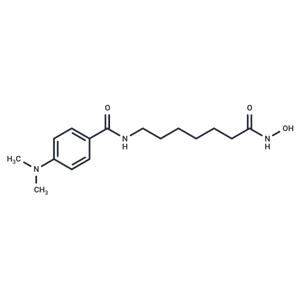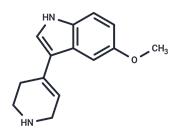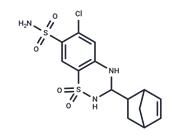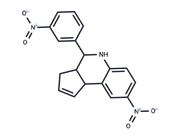| Name | M344 |
| Description | M344 (Histone Deacetylase Inhibitor III) is a potent HDAC inhibitor with IC50 of 100 nM and able to induce cell differentiation. |
| Cell Research | MEL DS19 cells (murine erythroleukemia cells) are maintained in D-MEM containing 100 units/mL penicillin G sodium and 100 μg/mL streptomycin sulfate supplemented with 10% fetal bovine serum at 37 °C in a 5% CO2 atmosphere. To test M344 for potential to induce cell differentiation, log-phase cells with a population doubling time of 11−13 hours are used. Serial dilutions of M344 are prepared in 24-well plates using 1 mL of D-MEM/well. If M344 are dissolved in DMSO, control wells contains the same amount of solvent (generally 2 μL/mL of medium). Subsequently, the cell suspension is added to the wells. After 72 hours the experiment is evaluated. Cell numbers are counted using a Casy 1 TTC flow cytometer. The proliferation of treated cells is expressed as percent proliferation in comparison with the solvent control. Differentiated MEL cells accumulate hemoglobin. Therefore, the induction of cell differentiation is determined by benzidine staining according to the literature. To 100 μL of cell suspension is added 10 μL of a 0.4% solution of benzidine in 12% acetic acid containing 2% Water2. Within 5 minutes hemoglobin-containing cells stains blue. Benzidine-positive and -negative cells are counted under the microscope in a hemocytometer, and the percentage of positive cells is calculated. M344 is first tested at 10 μM and 50 μM final concentration. According to activity/toxicity profile, a range of concentrations is chosen for a dose−response analysis. (Only for Reference) |
| Kinase Assay | Enzyme Inhibition : Radioactively labeled chicken core histones are used as the enzyme substrate. The enzyme liberated tritiated acetic acid from the substrate which is quantitated by scintillation counting. IC50 values are results of triple determinations. 50 μL of maize enzyme (at 30 °C) is incubated (30 minutes) with 10 μL of total [3H]acetate-prelabeled chicken reticulocyte histones (1 mg/mL). Reaction is stopped by addition of 36 μL of 1 M HCl/0.4 M acetate and 800 μL of ethyl acetate. After centrifugation (10000 g, 5 minutes) an aliquot of 600 μL of the upper phase is counted for radioactivity in 3 mL of liquid scintillation cocktail. M344 is tested in a starting concentration of 40 μM, and active substances are diluted further. |
| In vivo | In vitro, M344 showed significant antiproliferative activity against endometrial cancer cell lines Ishikawa and ovarian cancer cell line SK-OV-3 with EC50 of 2.3 μM and 5.1 μM, respectively, whereas normal human endometrial epithelial cells were almost insensitive to M344. M344 was toxic at concentrations higher than 10 μM, and only up to 20% of the surviving cell population was induced to differentiate. In addition, M344 caused a decrease in the proportion of cells in the S-phase and an increase in the proportion of cells in the G0/G1 phase of the cell cycle, induced apoptosis, and decreased the transmembrane potential of mitochondria. |
| Storage | Powder: -20°C for 3 years | In solvent: -80°C for 1 year | Shipping with blue ice. |
| Solubility Information | Ethanol : 4 mg/mL (13.01 mM)
H2O : < 1 mg/mL (insoluble or slightly soluble)
DMSO : 62 mg/mL (201.69 mM)
|
| Keywords | inhibit | Inhibitor | MS-344 | D-237 | HDAC | D237 | M-344 | D 237 | M 344 | Histone deacetylases | MS344 | M344 |
| Inhibitors Related | Valproic acid sodium salt | Panobinostat | Theophylline monohydrate | Sodium 4-phenylbutyrate | Vorinostat | Acefylline | Curcumin | Valproic Acid | Parthenolide | 4-Phenylbutyric acid | Theophylline | Methyl L-histidinate dihydrochloride |
| Related Compound Libraries | Apoptosis Compound Library | NF-κB Signaling Compound Library | Bioactive Compound Library | Epigenetics Compound Library | Inhibitor Library | NO PAINS Compound Library | Anti-Aging Compound Library | Bioactive Compounds Library Max | Anti-COVID-19 Compound Library | Anti-Cancer Compound Library |

 United States
United States



